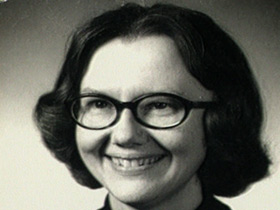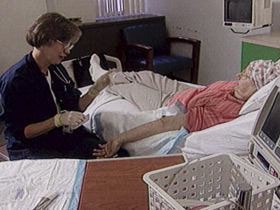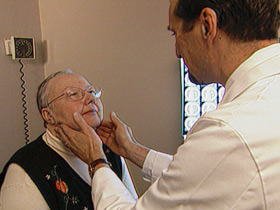Sister Mary Andrew Matesich
Sister Mary Andrew Matesich is a nun, a scientist, a former college president, and now, a cancer patient who learned not only how to accept her disease but how to help others because of it.
BOB ABERNETHY, anchor: We have a profile today of a remarkable and courageous woman, Sister Mary Andrew Matesich of Columbus, Ohio. She is a nun, a scientist, a former college president, and, now, a cancer patient who learned not only how to accept her disease but how to help others because of it. Betty Rollin reports.
BETTY ROLLIN: Sister Mary Andrew Matesich is no more an ordinary cancer patient than she is an ordinary nun.
At age 18, she joined the Dominican order, attended college, then in just three years got a master's and Ph.D. in chemistry at the University of California at Berkeley. At 39, she became president of Ohio Dominican, a liberal arts university, and in the years following had leadership roles in government, higher education, and community service.

Sister MARY ANDREW MATESICH: The sense of being called by God to a different kind of life, a life of service. When we take vows of poverty, chastity, and obedience, it's not because money, sex, and power are bad. They are not bad; they are good. But they are so good that they could distract us from the really important thing, which is love of God and love of neighbor.
ROLLIN: Given that her mother and her aunt had breast cancer, learning that she had it too wasn't a total surprise.
Sister MARY ANDREW: On the other hand, to hear the word "cancer" is such a shock, such a shock. I got mammograms every year, and my cancer grew to more than two inches before it was detected. I know now that I should have said, "Hey, doctor, feel over here up under my arm."
ROLLIN: Eleven years ago, at age 54, Sister Mary Andrew had a mastectomy.
Sister MARY ANDREW: You might be a celibate woman and not have children and not be sexually active, but it's defining of you as a woman.

ROLLIN: She resumed her life, but six years ago cancer returned to her lungs, to her liver, and most recently to her bones. Her illness forced her to leave the university, and she came to live at the Dominican assisted living quarters.
Do you ever get mad at God?
Sister MARY ANDREW: Oh yes. I was very mad at God for what happened to my mother. I really went through a big issue for some months with God about the amount of suffering my mother had.
ROLLIN: And are you mad at God for what he did to you?
Sister MARY ANDREW: I have been mad, but not as mad. In a sense, we wrestled it out then.
ROLLIN: How do you do that?
Sister MARY ANDREW: You have to express to God what you really feel, and you have to rail and yell, and you have to cry, and gradually there aren't answers, but there's acceptance that comes -- and strength.
ROLLIN: And something else came to Sister Mary Andrew, too: a wish to offer herself up for clinical trials.
Sister MARY ANDREW: This was a way to continue to be a help to other people. It was appealing to me as a scientist.
ROLLIN: She volunteered for no less than four clinical trials to test the efficacy of various drugs, and they took a toll on her: osteoporosis, collapsed vertebrae, nerve damage, and severe lung inflammation.
Sister MARY ANDREW: We are challenged as Christians by Jesus Christ to lay down our lives for one another. I respond to this by laying down my life consciously, choosing to be in these trials, not necessarily be cured -- that's very unusual, but so that we might learn more to help more people. That's a strong motivation for me, too.
ROLLIN: Sister Mary Andrew's oncologist, Dr. Charles Shapiro, conducted the trials.

Dr. CHARLES SHAPIRO: I think her overriding hopefulness and strength, even in bad times, is somewhat inspirational to me.
ROLLIN: Not that Sister Mary Andrew isn't sometimes sad about her situation.
Sister MARY ANDREW: We all love life. We all love life, and I'm 65, and that seems to me very young. Yet, I won't see 70.
ROLLIN: When you pray, what do you pray for?
Sister MARY ANDREW: I have a very hard time praying for myself; I always had. And so I pray for strength and to know what to do next. And I praise God. I thank God. We are here to praise God. Basically our very existence, every breath that we take praises God, and sometimes I just sit there and breathe and praise God in my breath. When I receive Holy Communion, I think about Christ being within me, and I do send him places. I say, "Do check out the hip; do check out the lungs."
ROLLIN: Are you afraid to die?
Sister MARY ANDREW: I'm not afraid to die; I'm afraid of the process.
ROLLIN: Of pain?
Sister MARY ANDREW: Pain, loss of control, anguish to others. I used to fantasize about being a snake and crawling out of my skin and leaving it behind. And then I thought, was that what death was?
ROLLIN: Do you think it's possible to die, just to die, and -- "The End"?
Sister MARY ANDREW: My faith tells me no. But, as we are reminded again by St. Paul, the reason we have hope is because don't have certitude. If we had certitude, we wouldn't need hope. And so I think there is always that question. But I'm not afraid of the disease anymore.
ROLLIN: In what sense are you not?
Sister MARY ANDREW: It's as though I looked into the eye of the dragon and said, "You may take my life, but you are not going to destroy me." And I don't care if you have cancer, metastatic cancer, or you are diabetic or what, you can still be fully alive and trying to live each day fully alive. That means a lot to me, and that's what I try to do.
ROLLIN: For RELIGION & ETHICS NEWSWEEKLY, I'm Betty Rollin in Columbus, Ohio.
Sister Mary Andrew Matesich is a nun, a scientist, a former college president, and now, a cancer patient who learned not only how to accept her disease but how to help others because of it.